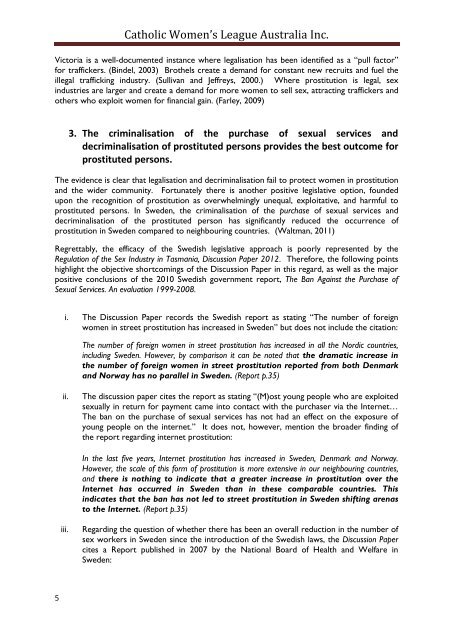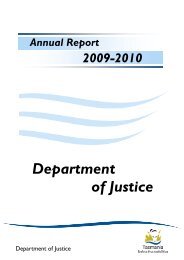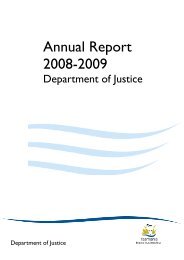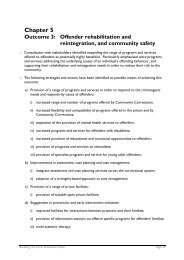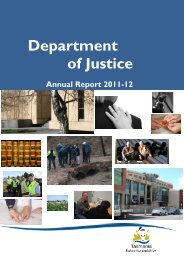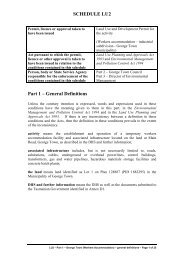Catholic Womens League - Tasmanian Department of Justice
Catholic Womens League - Tasmanian Department of Justice
Catholic Womens League - Tasmanian Department of Justice
You also want an ePaper? Increase the reach of your titles
YUMPU automatically turns print PDFs into web optimized ePapers that Google loves.
<strong>Catholic</strong> Women’s <strong>League</strong> Australia Inc.<br />
Victoria is a well-documented instance where legalisation has been identified as a “pull factor”<br />
for traffickers. (Bindel, 2003) Brothels create a demand for constant new recruits and fuel the<br />
illegal trafficking industry. (Sullivan and Jeffreys, 2000.) Where prostitution is legal, sex<br />
industries are larger and create a demand for more women to sell sex, attracting traffickers and<br />
others who exploit women for financial gain. (Farley, 2009)<br />
3. The criminalisation <strong>of</strong> the purchase <strong>of</strong> sexual services and<br />
decriminalisation <strong>of</strong> prostituted persons provides the best outcome for<br />
prostituted persons.<br />
The evidence is clear that legalisation and decriminalisation fail to protect women in prostitution<br />
and the wider community. Fortunately there is another positive legislative option, founded<br />
upon the recognition <strong>of</strong> prostitution as overwhelmingly unequal, exploitative, and harmful to<br />
prostituted persons. In Sweden, the criminalisation <strong>of</strong> the purchase <strong>of</strong> sexual services and<br />
decriminalisation <strong>of</strong> the prostituted person has significantly reduced the occurrence <strong>of</strong><br />
prostitution in Sweden compared to neighbouring countries. (Waltman, 2011)<br />
Regrettably, the efficacy <strong>of</strong> the Swedish legislative approach is poorly represented by the<br />
Regulation <strong>of</strong> the Sex Industry in Tasmania, Discussion Paper 2012. Therefore, the following points<br />
highlight the objective shortcomings <strong>of</strong> the Discussion Paper in this regard, as well as the major<br />
positive conclusions <strong>of</strong> the 2010 Swedish government report, The Ban Against the Purchase <strong>of</strong><br />
Sexual Services. An evaluation 1999-2008.<br />
i. The Discussion Paper records the Swedish report as stating “The number <strong>of</strong> foreign<br />
women in street prostitution has increased in Sweden” but does not include the citation:<br />
The number <strong>of</strong> foreign women in street prostitution has increased in all the Nordic countries,<br />
including Sweden. However, by comparison it can be noted that the dramatic increase in<br />
the number <strong>of</strong> foreign women in street prostitution reported from both Denmark<br />
and Norway has no parallel in Sweden. (Report p.35)<br />
ii.<br />
The discussion paper cites the report as stating “(M)ost young people who are exploited<br />
sexually in return for payment came into contact with the purchaser via the Internet…<br />
The ban on the purchase <strong>of</strong> sexual services has not had an effect on the exposure <strong>of</strong><br />
young people on the internet.” It does not, however, mention the broader finding <strong>of</strong><br />
the report regarding internet prostitution:<br />
In the last five years, Internet prostitution has increased in Sweden, Denmark and Norway.<br />
However, the scale <strong>of</strong> this form <strong>of</strong> prostitution is more extensive in our neighbouring countries,<br />
and there is nothing to indicate that a greater increase in prostitution over the<br />
Internet has occurred in Sweden than in these comparable countries. This<br />
indicates that the ban has not led to street prostitution in Sweden shifting arenas<br />
to the Internet. (Report p.35)<br />
iii.<br />
Regarding the question <strong>of</strong> whether there has been an overall reduction in the number <strong>of</strong><br />
sex workers in Sweden since the introduction <strong>of</strong> the Swedish laws, the Discussion Paper<br />
cites a Report published in 2007 by the National Board <strong>of</strong> Health and Welfare in<br />
Sweden:<br />
5


